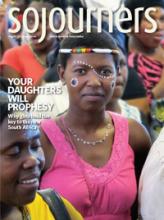I write, I can put any word that fits my sentence. I can feel any kind of emotion I want to go through. And I find that I am able to heal myself with my own words.
-- Ntombizanele, age 18
Ntombizanele hates her voice. It sounds like she's getting over a sore throat, low and gravelly as an unpaved road. She's self-conscious about it, as most any 18-year-old would be, and didn't use it much when I first met her. When she did speak, I had to lean forward and concentrate to hear what she had to say. Her name means "no more girls" in Xhosa. She’s the second daughter.
Ntombi, as she's called, lost her mother to AIDS several years ago. (To respect privacy, I've chosen to use first names only in this story.) Now she and her three siblings live with two aunts and many cousins in a small house in Gugulethu, a black township outside Cape Town. In December 2009, Ntombi completed Grade 12 but failed two of her matriculation final exams, math and science. So she could not receive her "matric," South Africa's high school diploma. Without school or a job to occupy her days, she fell into a pattern. Each week began on Monday with a trip in an overcrowded minibus taxi from Gugulethu into Cape Town to visit the public library. She would check out seven books, the maximum number allowed, all fantasy and romance novels. Then she returned home, crawled into bed, and read. She spent every day this way, sometimes finishing all those books in two days.
I came to know Ntombi when she joined the creative writing club for girls that I established in Gugulethu in February 2010. On Saturday afternoons for a year, anywhere from four to 22 girls, ages 13 through 20, gathered at J.L. Zwane Presbyterian Church and Community Centre. At our first meeting, we brainstormed and named the club Amazw'Entombi. It means "voices of the girls" in the Xhosa language, which most of them spoke before they learned English.
Read the Full Article

